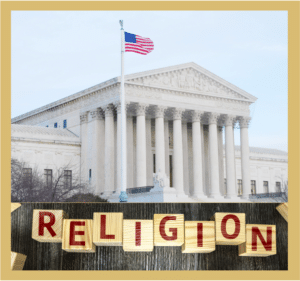Title VII of the Civil Rights Act of 1964 requires employers to make reasonable accommodations for employees’ religious beliefs, as long as doing so doesn’t cause undue hardship to the employer’s business. However, what counts as an “undue hardship” has been a topic of debate. For years, lower courts interpreted “undue hardship” using a “de minimis” standard, meaning that if an employer could demonstrate that an accommodation would cause more than a very minimal or trivial cost or inconvenience, it could be a basis for refusing the religious accommodation. Many thought this made it too easy for employers to reject accommodation requests. However, this has changed.
In a unanimous decision on June 29, 2023, the United States Supreme Court in Groff v. DeJoy, Postmaster General, No. 22-174, overturned lower court decisions and reiterated what it means for an employer to experience “undue hardship” when asked to provide religious accommodations.
The Case Background
The case revolved around petitioner Gerald Groff, an Evangelical Christian who worked for the United States Postal Service (USPS). Groff believed, for religious reasons, that Sunday should be a day of rest and worship. His job initially did not require Sunday work until the USPS agreed to facilitate Sunday deliveries for Amazon. To avoid working on Sundays, Groff transferred to a rural USPS station, which did not make Sunday deliveries. However, once Amazon deliveries began at that station too, Groff remained unwilling to work on Sundays.
Groff received “progressive discipline” for refusing to work on Sundays and eventually resigned. Groff sued under Title VII of the Civil Rights Act of 1964, claiming that USPS could have accommodated his religious practice of observing Sunday as a day of rest “without undue hardship on the conduct of [USPS’s] business.”
The District Court and the Third Circuit sided with USPS, affirming that even the “de minimis” costs to USPS, including disrupting workflow and diminishing employee morale, constituted undue hardship. The Third Circuit based its decision on the Supreme Court’s decision in Trans World Airlines, Inc. v. Hardison, which was interpreted as implying that any cost above “de minimis” (trivial) could be considered an undue hardship.
The Supreme Court’s Judgment
The Supreme Court saw things differently. The Court’s decision in Groff highlights that “undue hardship” must be understood as a significant burden. The Court emphasized the importance of historical context, especially regarding Title VII’s provisions for religious accommodations. Title VII was amended in 1972 to specify that employers must “reasonably accommodate” an employee’s religious observance or practice unless this would cause “undue hardship on the conduct of the employer’s business.” It stated that “undue hardship” should not be construed as minor inconveniences or negligible costs. Instead, an employer must prove that the accommodation would result in substantial difficulties or expenses in relation to its business operations. It noted that the Hardison decision contained conflicting language regarding “de minimis” and “substantial” costs and that lower courts latched onto the “de minimis” standard, despite the contradictory language in the same decision. The Court clarified that the “undue hardship” standard requires employers to demonstrate more than just de minimis cost and must show substantial increased costs in relation to the conduct of their business.
This decision effectively sets a higher threshold for employers to refuse accommodation requests on the grounds of undue hardship. It insists that employers explore all potential options and cannot just claim that an accommodation would be difficult without considering and trying to find feasible alternatives.
What does this mean in practice?
1. Context Matters: The size, nature, and operating costs of a business are crucial. What might be a substantial burden for a small business might not be considered substantial for a larger corporation.
2. Employees First, Coworkers Second: The Court highlighted that coworkers’ displeasure does not necessarily constitute an undue hardship unless it significantly affects the business. Additionally, if coworkers’ unhappiness is due to bias against the religion or accommodation, that cannot be considered as a factor at all.
3. Employers Must Explore Options: The Court underlined that an employer must actively try to make reasonable accommodations and explore alternative solutions.
The decision is a significant milestone for employees seeking religious accommodations. It ensures that their rights are taken seriously and emphasizes that employers must give serious consideration to accommodation requests, rather than merely citing trivial reasons to avoid making accommodations. However, it is essential to know that this does not mean all religious accommodation requests will be granted. Employers can still argue that a request is an undue hardship, but they must now demonstrate that it is genuinely substantial.
Sinapi Law Associates, Ltd. has a proven track record over a period of nearly 40 years of protecting and vindicating the employment law rights of individuals. You can learn more about our employment law practice here. If you believe your employment law rights may have been violated, you can submit a request for a free case evaluation here or give us a call at 401-739-9690.






